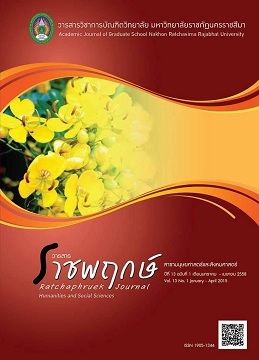The Development of English Speaking Instructional Model for Students of Tapee University
Main Article Content
Abstract
The purposes of this study were; 1) to develop an instructional model of English speaking for the students of Tapee University, and 2) to study effects of the developed instructional model. The population used in this study were 145 first year undergraduate students of Tapee University and the samples were 66 first year students selected with purposive samplings technique. They were randomly assigned to an experimental and control groups of 32 and 34 persons, respectively. The research instruments were; 1) instructional model of English speaking for the students, 2) learning management plan, 3) the test of English speaking skill, and 4) the attitude inventory towards the instructional model. The statistics used for data analysis were; mean, standard deviation, analysis of covariance (ANCOVA), and t-test.
The findings of this study were as follows:
1. The instructional model consisted of five components; 1) principles, 2) objectives, 3) the instructional process, 4) contents, and 5) measurement and evaluation. It was evaluated by experts and found to be highest appropriate instructional (= 4.77, S.D. = 0.41).
2. The comparison of learning outcome was revealed that;
2.1 The English speaking skill of the experimental group learning through the developed instructional model was significantly higher than that control group at the .01 level.
2.2 The attitudes toward the instructional model of the experimental group was at high level (= 3.67, S.D. = 1.09) which was higher than the set 3.50 criterion.
Article Details
References
ดวงตา อินทรนาค. (2555). ศึกษาความต้องการในการพัฒนาด้านภาษาอังกฤษของนักศึกษาคณาจารย์และผู้บริหาร มหาวิทยาลัยตาปี. สุราษฎร์ธานี : มหาวิทยาลัยตาปี.
ทิศนา แขมมณี. (2554). ศาสตร์การสอน. พิมพ์ครั้งที่ 12. กรุงเทพฯ : ด่านสุธาการพิมพ์.
สุมิตรา อังวัฒนกุล. (2540). วิธีสอนภาษาอังกฤษ. พิมพ์ครั้งที่ 4. กรุงเทพฯ : จุฬาลงกรณ์มหาวิทยาลัย.
พรรณวร บุญประเศรษฐผล. (2552). การพัฒนารูปแบบการสอนภาษาอังกฤษ โดยใช้การเรียนรู้แบบเน้นประสบการณ์ สำหรับนักศึกษาระดับประกาศนียบัตรวิชาชีพชั้นสูง. ปริญญานิพนธ์การศึกษาดุษฎีบัณฑิต สาขาวิชาหลักสูตรและการสอน บัณฑิตวิทยาลัย มหาวิทยาลัยนเรศวร.
พัชรนันท์ จันทร์เกียรติกร. (2553). ผลการพัฒนาทักษะการพูดภาษาอังกฤษ ของนักเรียนชั้นประถมศึกษาปีที่ 6. รายงานการศึกษาค้นคว้าอิสระการศึกษามหาบัณฑิต สาขาหลักสูตรและการสอน บัณฑิตวิทยาลัย มหาวิทยาลัยมหาสารคาม.
ฟาฏินา วงศ์เลขา. (2553). พัฒนาภาษาอังกฤษเตรียมเด็กไทยสู่อาเซี่ยนและเวทีโลก. ม.ป.ท.
อารีย์ ปรีดีกุล. (2553). การพัฒนารูปแบบการสอนทักษะการฟัง-พูดภาษาอังกฤษ ตามหลักการสอนภาษา. วิทยานิพนธ์การศึกษาดุษฎีบัณฑิต สาขาวิชาหลักสูตรและการสอน บัณฑิตวิทยาลัย มหาวิทยาลัยนเรศวร.
อนุสิษฐ์ พันธ์กลํ่า. (2552). การพัฒนาชุดการสอนเพื่อส่งเสริมทักษะการฟัง-พูดภาษาอังกฤษ ของนักศึกษาโปรแกรมวิชาภาษาอังกฤษ ชั้นปีที่ 2 คณะครุศาสตร์ มหาวิทยาลัยราชภัฏกำแพงเพชร. กำแพงเพชร : มหาวิทยาลัยราชภัฏกำแพงเพชร.
Bailey, Kathleen M. (2005). Practical English Language Teaching : Speaking. New York : McGraw-Hill.
Brown, R. Sanborn and Nation Paul. (2003). Teaching speaking : Suggestions for the classroom. [Online]. Available : http://langue.hyper.chubu.ac. jp/jan/speaking.html. Retrieved [2011, January 15].
Chou, Yen-Lin. (2004). Promoting Learners’ Speaking Ability by Social affective Strategies, USA : University of Southern California.
Hatice, Bayindir. (2003). An Investigation of students’ Attitudes Towards Brain based Applications in English Composition Skills II Course : A Case study. Master’s thesis, Foreign Language Education, Middle East Technical University.
Joanna, Baker and Heather Westrup. (2003). Essential speaking skills : A handbook for English language teachers. London : Continuum.
Johnson, R. T. and D. W. Johnson. (2001). Cooperative Learning. Minnesota : The University of Minnesota.
Joyce, B., and M. Weil. (2000). Model of Teaching. Boston : Allyn and Bacon.
Kann, D. (2011). Over the course of foreign language learning. Doctoral dissertation, College of education, San Diego state University.
McGroatry, M., and R. Oxford. (1990). “Language Learning Strategies : An introduction and Two related studies.” Padilla, A. M., et al., eds. Foreign Language Education : Issues and Strategies. pp. 56-74. CA : SAGE.
Oxford, R. L. (1990). Language Learning Strategies : What Every Teacher Should Know. Boston : Newbury House.
Olsen, R. E. and S. Kagan. (1992). “About Cooperative Learning.” In Kressler, C. ed. Cooperative Language Learning. New Jersey : Prentice-Hall.
O’ Malley, J. Michael and Chamot Anna Uhl. (1995). Learning Strategies in Second Language Acquisition. 4th ed. New York : Press Syndicate of University of Cambridge.
Romiszowski, A. J. (1970). A Systems Approach to Training and Education. London : Kogan Page.
Rubin, J. (1987). Learner strategies theoretical assumptions research. n.p.
Schoderbek, Peter P. and others. (1990). Management System : Conceptual Consideration. 4th ed. USA : Richard D.Irwin.
Slavin, R. E. (1995). Cooperative Learning Theory, Research and Practice. 2nd ed. Massachusetts : Allyn and Bacon.
Tareq, Mitib Saed Murad. (2009). The Effect of Task-Based Language Teaching on Developing Speaking Skills among the Palestinian Secondary EFL Students in Israel and Their Attitudes towards English. Doctoral dissertation, Faculty of Education, Yarmouk University.
Wang, Cheng-jun. (2006). Design to communicate in English course for college. [Online]. Available : library, dialog, sheets/html. [2012, November 20].


